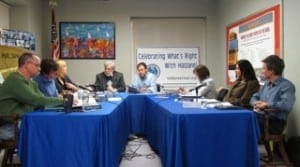
When is 2 percent not really 2 percent?
By Michael Turton
Business Manager Anne Dinio jokingly asked if anyone was still awake after her presentation on the New York State property tax cap at the Feb. 7 meeting of the Haldane School Board. There were some quiet chuckles, but no one in attendance, least of all Dinio, was laughing about the cap’s potential effect on Haldane’s 2012-13 budget. Administration and trustees are rolling up their sleeves as they begin formulating next year’s spending plan. Background information was presented to set the stage for future meetings at which some very difficult decisions may have to be made.
Much has been made of Governor Cuomo’s 2 percent cap on the amount a school district can raise by directly taxing its residents. But as Haldane Superintendent Mark Villanti has pointed out, the permissible percentage increase in the levy will actually vary from school district to school district.
Some of what is known going into the 2012-13 budget cycle
The 2011-12 budget for the Haldane Central School District totaled $21,630, 013. In order to achieve that budget, the tax levy was increased by 2.12 percent from the previous year. If nothing were to change in the Feb. 7 financial figures – a scenario that Dinio warned was unlikely given the New York State Education Department’s (NYSED) tendency to change funding formulas in midstream – Haldane would be permitted to increase the tax levy by up to 3.36 percent. Dinio’s warning proved prophetic. In an email to Philiptown.info on Feb. 13, Villanti said, “We learned last Friday that NYSED is changing the formula once again. It [the maximum tax levy] will be just a little lower.”
In recent years, Haldane has managed to keep tax levy increases at moderate to low levels. After a large increase of 10.2 percent in 2007-08, increases over the next four years were 3.6 percent, 2.33 percent, 0.93 percent and 2.12 percent. Those levels were achieved in part through strategic use of reserve funds the board established, along with favorable fund balances at year-end. Villanti said it will be another two weeks before current reserves and fund balances are known. “We should use part of them,” he said. “But not so [much] that we create a hole that is insurmountable for future budgets.”
Villanti has cultivated a conservative approach to budgeting since he took over as superintendent in 2007 – regularly cautioning trustees and administration not to overestimate revenues while not underestimating expenditures. Commenting on the likely approach to the 2012-13 budget he said, “We will not likely go with the tax cap limit… our target will likely be lower… but that decision has not been made yet by the Board of Education”.
Asked if the challenges trustees face boil down to a combination of the tax cap, decreasing state aid and continued increase in costs, Villanti said, “It is the long-term impact of the tax cap that has boards and superintendents worried. You can’t keep reducing aid, experience limited or no economic growth locally and stay within the cap. Over time it will erode the quality of education. The big unknown is if, when and to what extent, the economy rebounds. If we get a good bump at some point it will help districts deal with the cap.”
One positive factor is the settled contracts with unions representing both teachers and support staff. “Our employee contracts …the employer negotiated aspects, are below the cap overall. This helps, but …when you factor in health care and pensions we are over the cap – but those costs are not locally controlled, “Villanti said. Wages and benefits make up about 80 percent of the total budget. “It is unlikely [with] people living longer; the cost of health care and pensions, that those costs will remain within the cap limits. With all of the talk of relief from unfunded mandates from the governor’s office and the legislature – almost nothing of any significance has changed,” he said. Many budget meetings lay ahead. The ultimate test will be when voters go to the polls on May 15 to say “yes” or “no” to the proposed 2012-13 spending plan.
In other business
Residents who want to keep up with Haldane business on a regular basis can now go to the District website and click on “the blue button” to be added to the email list.
Villanti reported that the $150,000 grant received through State Senator Greg Ball’s office will be devoted mainly to upgrading the ball fields on Route 9D. Improvements will be made to backstops, fencing, storage and dugouts and a well will be drilled. “There are some clear safety issues there,” he said. Repairs will also be made to the tennis courts.
A special public meeting will be held on Wednesday, Feb. 15 at 6 p.m. in the music room to discuss the proposed system of teacher evaluations. At 7 p.m. the meeting will continue with a discussion of the Ward Associates study of sports fields in Philipstown and its implications for Haldane. Both president Joe Curto and trustee Mike Junjulas seemed to favor Haldane taking an aggressive stance in its approach to the study – which also included the Town of Philipstown, Villages of Cold Spring and Nelsonville and Garrison School District. “I don’t want to sit in the back seat on this,” Curto said. “We should be in the front seat.” Junjulas agreed. “Some people said we should wait until everybody agrees. I don’t think so. If we decide to do something with the athletic fields – we should do it – but spend carefully,” he said. Villanti added, “This isn’t just about intercollegiate athletics; it’s also our outdoor physical education program as well.”
The trustees also approved a resolution ratifying the new contract between the school board and Civil Service Employees Association (CSEA). The contract runs through June 30, 2014 and can be viewed on the Haldane website.
